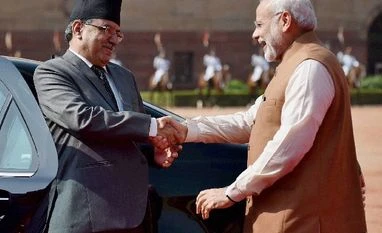The political situation in Nepal and ways to speed up implementation of India-sponsored infrastructure projects in the Himalayan nation was the focus of a high-level meeting on Thursday between the two countries.
The fourth session of the India-Nepal Joint Commission meeting also conducted a comprehensive review of bilateral engagement in diverse areas, including trade and investment, defence and security, border management and infrastructure development.
The meeting was co-chaired by Minister of State for External Affairs M J Akbar and Nepal's Minister of Foreign Affairs Prakash Sharan Mahat.
"The Joint Commission provided an opportunity to review political exchanges and bilateral cooperation in all areas and to provide necessary political guidance for further enhancing the traditionally warm and close relations," External Affairs Ministry Spokesperson Vikas Swarup said.
During his visit here last month, Nepal Prime Minister Pushpa Kumar Dahal 'Prachanda' had said a solution to the Madhesi problem was in sight soon and noted that legitimate demands will be accommodated within the framework of the Constitution.
The issue is understood to have figured in today's meeting, which was also attended by Foreign Secretary S Jaishankar and his Nepalese counterpart Shankar Das Bairagi.
More From This Section
Swarup said the Joint Commission reviewed the progress in projects covered under the Lines of Credits extended to Nepal by India, and agreed to expedite their implementation.
"Both sides agreed to closely monitor progress of all development and infrastructure projects such as the Terai roads, the cross-border rail links, development of integrated check-posts, cross-border transmission line projects, hydro-power project, cross-border oil pipeline, and address any bottlenecks on both sides to expedite the implementation of these projects," he said.
Swarup said the Commission "reviewed and positively assessed" implementation of decisions emerging from high-level exchanges, including during visits of Prime Minister Narendra Modi to Nepal in August and November 2014 and visits of Nepalese PMs to India in February, September and October this year.
"The intensive interaction at the highest political levels and regular meetings of important bilateral mechanisms demonstrate the priority that India attaches to furthering relations and cooperation with people and Government of Nepal," said Swarup.
The joint commission reviewed the political situation in
Nepal. The Madhesis, mostly people of Indian origin, has been strongly opposing certain provisions of the Constitution, saying those will politically marginalise the community. The Madhesis have been seeking India's intervention on the issue.
Swarup said both sides acknowledged the significant progress made since the last meeting of the Joint Commission in taking forward bilateral initiatives in areas such as trade, transit, economic, mutual investment, defence and security, border management, power and water.
He also said deliberations were held on cross-border transport facilitation, education, cultural and youth exchanges, tourism, railways, infrastructure development, capacity building and human resource development, and promotion of people-to-people contact, among others.
India conveyed its readiness to move forward expeditiously on post-earthquake reconstruction projects in partnership with the Government of Nepal, within the inter- governmental framework of India's assistance package of USD one billion.
"Both sides decided to convene bilateral mechanisms at an early date to promote cooperation in areas such as trade, transit, civil aviation, water resources," said Swarup.
The third session of the Joint Commission was held in Kathmandu in July, 2014.
)